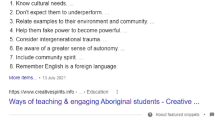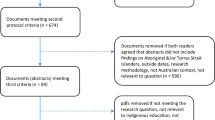Abstract
In this commentary on Brayboy and Castagno’s paper, published in this volume, we discuss, on the one hand, many points of agreement between their proposal of culturally responsive schooling for indigenous youth and El-Hani and Mortimer’s proposal of culturally-sensitive science education. On the other hand, we focus on a key disagreement, not only with Brayboy and Castagno, but with a whole body of literature on multicultural, postcolonialist, postmodernist education. The main point of disagreement lies in the fact that we are not sure that to broaden the concept of science so as to talk about “native science” or “indigenous science” is indeed the best strategy to attain a goal that we wholeheartedly share with Brayboy and Castagno, to value other ways of knowing for their own sake, validity, and legitimacy.
Similar content being viewed by others
References
Bakhtin, M. (Volochinov, V. N.) ([1929]1992). Marxismo e filosofia da linguagem. São Paulo: Hucitec.
Bakhtin, M. (2000). Estética da criação verbal (3rd ed.). São Paulo: Martins Fontes.
Bandeira, F. P., Castro, M., Chaves, M. J., Colaço, M., de Dantas, M. F., Almeida, T., Moura, L., & Modercín, I. (2007). O Povo Pankararé. In J. Marques (Org.). As caatingas: Debates sobre a ecorregião do Raso da Catarina (pp. 126–150). Paulo Afonso: Secretaria de Meio Ambiente e Recursos Hídricos do Estado da Bahia, Fonte Viva.
Bandeira, F. P. S., Chaves, J. M., & Lobão, J. S. B. (2005). An analysis of the indigenous ecosystem management strategies of Caatinga in the Raso da Catarina, Bahia, Brazil. In Proceedings Annual Meeting of the Association for Tropical Biology and Conservation. Uberlândia-MG: UFU.
Bandeira, F. P., Toledo, V. M., & López-Blanco, J. (2002). Tzotzil Maya ethnoecology: Landscape perception and management as a basis for coffee agroforest design. Journal of Ethnobiology, 22, 247–272.
Banks, J. A. (2008). An introduction to multicultural education (4th ed.). Boston: Pearson Education.
Baptista, G. S. C., & El-Hani, C. N. (2006). Investigação etnobiológica e ensino de biologia: Uma experiência de inclusão do conhecimento de alunos agricultores na sala de aula de Biologia. In P. M. M. Teixeira (Org.). Ensino de ciências: Pesquisas e reflexões (pp. 84–96). Ribeirão Preto: Holos.
Baptista, G. C., & El-Hani, C. N. (2007). Ethnobiology and dialogue between ways of knowing in biology teaching: A case study in a Brazilian public high school. Science & Education (Submitted).
Bauer, H. H. (1994). Scientific literacy and the myth of the scientific method. Chicago: University of Illinois Press.
Brayboy, B. M. J., & Castagno, A. E. (2008). How might Native science inform “informal science learning”? Cultural Studies of Science Education. doi:10.1007/s11422-008-9125-x.
Cobern, W. W., & Aikenhead, G. S. (1998). Cultural aspects of learning science. In B. J. Fraser & K. Tobin (Eds.), International handbook of science education (pp. 39–52). Dordrecht: Kluwer Academic Publishers.
Cobern, W. W., & Loving, C. C. (2001). Defining “science” in a multicultural world: Implications for science education. Science Education, 85, 50–67. doi:10.1002/1098-237X(200101)85:1<50::AID-SCE5>3.0.CO;2-G.
Deloria, V. (1992). Relativity, relatedness, and reality. Winds of Change, Autumn, 35–40.
El-Hani, C. N., & Mortimer, E. F. (2007). Multicultural education, pragmatism, and the goals of science teaching. Cultural Studies of Science Education, 2, 657–687. doi:10.1007/s11422-007-9064-y.
El-Hani, C. N., & Pihlström, S. (2002). A pragmatic realist view of emergence. Manuscrito, XXV, 105–154.
Fleer, M. (1997). Science, technology, and culture: Supporting multiple worldviews in curriculum design. Australian Science Teachers’ Journal, 43, 13–18.
Fordham, S. (1988). Racelessness as a factor in Black students’ school success: Pragmatic strategy or pyrrhic victory? Harvard Educational Review, 58, 54–84.
Greene, J. C. (1981). Science, ideology, and world view. Bekerley: University of California Press.
Hacking, I. (1983). Representing and intervening. Cambridge: Cambridge University Press.
Hoffmann, M. H. G. (2007). Learning without belief-change? Cultural Studies of Science Education, 2, 688–694.
Kawagley, A. (1990). Yup’ik ways of knowing. Canadian Journal of Native Education, 17, 5–17.
Kuhn, T. S. (1977). Objectivity, value judgment, and theory choice. In The essential tension (pp. 320–339). Chicago: The University of Chicago Press.
Maffi, L. (1998). Domesticated land, warm and cold: Linguistic and historical evidence on Tenejapa Tzeltal Maya ethnoecology. In T. L. Gragson & B. G. Blount (Eds.), Ethnoecology: Knowledge, sources and rights (pp. 41–56). Athens: The University of Georgia Press.
Mahner, M., & Bunge, M. (1996). Is religious education compatible with science education? Science & Education, 5, 91–99. doi:10.1007/BF00428611.
Martin, K. (1995). The foundational values of cultural learning: The Akhkwasahsne science and math pilot project. Winds of Change, 10, 50–55.
Matthews, M. R. (1994). Science teaching: The role of history and philosophy of science. New York: Routledge.
Mortimer, E. F. (2000). Linguagem e formação de conceitos no ensino de ciências. Belo Horizonte: Editora UFMG.
Mortimer, E. F., & Machado, A. H. (2000). Anomalies and conflicts in classroom discourse. Science Education, 84, 429–444. doi:10.1002/1098-237X(200007)84:4<429::AID-SCE1>3.0.CO;2-#.
Mortimer, E. F., & Scott, P. H. (2003). Meaning making in secondary science classrooms. Maidenhead: Open University Press.
Ogawa, M. (1995). Science education in a multiscience perspective. Science Education, 79, 583–593. doi:10.1002/sce.3730790507.
Pomeroy, D. (1992). Science accross cultures: Building bridges between traditional Western and Alaskan native cultures. In S. Hills (Ed.), History and philosophy of science in science education (Vol. 2, pp. 257–268). Kingston, ON: Queen’s University.
Santos, B. S. (2001). As tensões da modernidade. In Fórum Social Mundial, Biblioteca das Alternativas. Available at http://www.forumsocialmundial.org.br, accessed at April 15th 2008.
Scott, P. H., Mortimer, E. F., & Aguiar, O. G. (2006). The tension between authoritative and dialogic discourse: A fundamental characteristic of meaning making interactions in high school science lessons. Science Education, 90, 605–631. doi:10.1002/sce.20131.
Shrader-Frechette, K., & McCoy, E. D. (1994). Applied ecology and the logic of case studies. Philosophy of Science, 61, 228–249. doi:10.1086/289797.
Siegel, H. (1997). Science education: Multicultural and universal. Interchange, 28, 97–108. doi:10.1023/A:1007314420384.
Snively, G. (1990). Traditional native Indian beliefs, cultural values, and science instruction. Canadian Journal of Native Education, 17, 44–59.
Snively, G., & Corsiglia, J. (2001). Rediscovering indigenous science: Implications for science education. Science Education, 85, 6–34. doi:10.1002/1098-237X(200101)85:1<6::AID-SCE3>3.0.CO;2-R.
Southerland, S. A. (2000). Epistemic universalism and the shortcomings of curricular multicultural science education. Science & Education, 9, 289–307. doi:10.1023/A:1008676109903.
Wittgenstein, L. (1969). On certainty. Oxford: Blackwell.
Author information
Authors and Affiliations
Corresponding author
Rights and permissions
About this article
Cite this article
El-Hani, C.N., Souza de Ferreira Bandeira, F.P. Valuing indigenous knowledge: to call it “science” will not help. Cult Stud of Sci Educ 3, 751–779 (2008). https://doi.org/10.1007/s11422-008-9129-6
Received:
Accepted:
Published:
Issue Date:
DOI: https://doi.org/10.1007/s11422-008-9129-6




